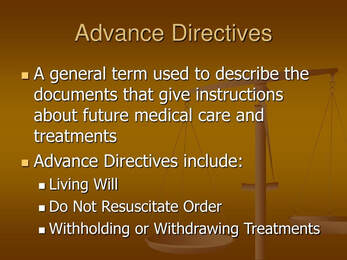 Having an advance directive means that you have chosen to share your medical history with a trusted individual so that they know how you want your end-of-life care to go. This person is often called a healthcare proxy, but can also be a family member or friend. Having an advance directive in place ensures that you will receive the care and treatment that you want when the time comes. What is an Advance Directive? An advance directive, also known a health care proxy, is a legal document that lets you choose the kind of care you want to receive in your final days. It can also name someone to make medical decisions on your behalf if you're incapacitated and are unable to speak for yourself. Usually, a written will is the document that determines your wishes after you die. But an advance directive is a legal document that does the same thing, except while you are yet living. It helps ensure that you're comfortable with what happens to you when you get sick and are near death, while also helping a loved one or your healthcare proxy to make the decisions you would have made for yourself. There are three basic types of advance directives. Why You Need an Advance Directive Even if you are not planning to die within the next two years, having an advance directive in place ensures that you have the knowledge and information that you need. Just in case you have any changes to your health that you aren’t aware of, or if you get an unexpected diagnosis or have a medical emergency, your healthcare proxy has the information necessary to help you or your family members make important medical decisions. Your Healthcare Proxy Has Important Legal Powers If you don’t have an advance directive in place, you won’t be able to make any decisions about your end-of-life care. Your healthcare proxy can make those decisions for you, and even do so without your knowledge. Living Will The first step to completing an advance directive is to make a list of all the things that you would like to happen in the event that you become incapable of making decisions for yourself. This could be anything from who should make decisions about your treatment to who you would like to take care of you if you become unable to do so yourself. Do Not Resuscitate Order If you have an advanced directive in place and a DNR order, it is possible that you could still be taken off the life support system if your heart stops. If you have DNR orders, your healthcare proxy would first communicate this to the healthcare team. If your health declines further, you can be taken off life support when all else has failed. If you have a DNR order in place, then your healthcare proxy will have the power to end your life on their terms, but would have to contact the emergency medical services as soon as your heart stops. Medical Power of Attorney This document is what allows someone else to make healthcare decisions for you if you are no longer able to do so for yourself. It provides a reliable, durable, and durable medium for communicating your wishes to other individuals so that no time is wasted and no one gets surprised - so that everyone is on the same page and knows your wishes. Conclusion Advanced directives are an important way to ensure that you and your family members are kept up to date with your medical and end-of-life decisions. It is important to take a little time to plan out what you want, and that it is communicated to the people around you. It may be something as simple as having a paper copy of your preferences to hand for your healthcare proxy or the doctor or hospital who will be caring for you at the end of your life. ---------- TheEulogyWriters.com can help you write a beautiful tribute that captures their life and unique passions. Please keep us in mind when the time comes. TheEulogyWriters.com
0 Comments
Your comment will be posted after it is approved.
Leave a Reply. |
Archives
July 2024
AuthorSteve Schafer is the founder of TheEulogyWriters and the author of hundreds of heartfelt, wonderful eulogies. He lives in Texas and has been writing eulogies for well over thirty years. The articles in this blog are designed to help people through the process of losing loved ones and exploring issues in the aging process. |
|
The Eulogy Writers
4092 Old Dominion Dr. West Bloomfield, MI 48323 |
Writers: Steve Schafer, Ralph DiBiasio-Snyder, Abi Galeas, Miriam Hill
Steve's Personal Cell Phone: (734) 846-3072 Our email address is: [email protected] |